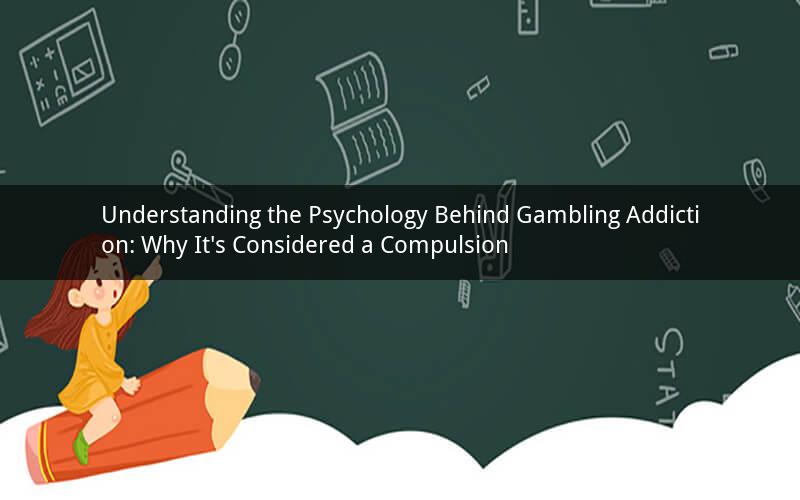
Gambling has been a part of human culture for centuries, but it has only been in recent times that we have come to understand the psychological underpinnings of why it is considered an addiction. This article delves into the reasons behind why gambling has the power to become an all-consuming compulsion, affecting both the individual and their loved ones.
1. The Thrill of the Gamble
One of the primary reasons why gambling is often considered an addiction is the thrill it provides. The act of gambling itself is an adrenaline rush, as it combines risk, reward, and anticipation. The potential for winning big can create a sense of excitement and happiness that is difficult to replicate in other areas of life. This thrill can become an addiction when individuals seek out the same high repeatedly, leading them to prioritize gambling over other responsibilities and relationships.
2. The Role of Dopamine
Neuroscience has revealed that gambling triggers the release of dopamine, a neurotransmitter associated with pleasure and reward. When individuals engage in gambling, the brain releases dopamine, creating a sense of euphoria. Over time, the brain becomes accustomed to this chemical reward, and individuals may become more compelled to seek out gambling experiences to recreate the same feeling. This dopamine-driven addiction can make it challenging for individuals to quit gambling, as the brain craves the reward it has come to associate with gambling activities.
3. Cognitive Dissonance and Rationalization
Cognitive dissonance is a psychological phenomenon that occurs when individuals experience a discrepancy between their beliefs and their actions. In the case of gambling addiction, individuals may believe that gambling is a form of entertainment or a way to make money, yet their actions reveal a different truth. This discrepancy can lead to cognitive dissonance, where individuals rationalize their gambling behavior by convincing themselves that they can control it or that they are just having a good time. This rationalization can further entrench the addiction, making it more difficult for individuals to acknowledge the severity of their problem.
4. Social and Cultural Factors
Gambling addiction is not solely a psychological issue; it is also influenced by social and cultural factors. In some societies, gambling is seen as a form of entertainment or a way to escape reality. The normalization of gambling can make it more appealing and difficult to resist. Additionally, social pressures, such as the desire to impress others or the influence of friends who also gamble, can contribute to the development of an addiction.
5. Financial Consequences
The financial consequences of gambling addiction are significant. Individuals who are addicted to gambling may spend a considerable amount of money on betting, often leading to financial ruin. The loss of money can create a sense of desperation, driving individuals to continue gambling in the hope of recouping their losses. This cycle of chasing losses can be difficult to break, as the individual becomes more focused on the money they have lost rather than the enjoyment of the game itself.
Q1: What are some common signs of a gambling addiction?
A1: Common signs of a gambling addiction include spending excessive amounts of time and money on gambling, feeling restless or irritable when not gambling, lying about gambling activities, and prioritizing gambling over other responsibilities and relationships.
Q2: How can a person overcome a gambling addiction?
A2: Overcoming a gambling addiction often requires a combination of professional help, support from friends and family, and self-discipline. Treatment options may include therapy, support groups, and financial counseling. It is essential for individuals to recognize the severity of their addiction and seek help from qualified professionals.
Q3: Can gambling addiction be treated effectively?
A3: Yes, gambling addiction can be treated effectively. With proper treatment and support, individuals can overcome their addiction and lead fulfilling lives. Treatment may involve therapy, medication, and lifestyle changes, and it is crucial for individuals to commit to their recovery process.
Q4: How can loved ones support someone with a gambling addiction?
A4: Loved ones can support someone with a gambling addiction by providing emotional support, encouraging them to seek help, and holding them accountable for their actions. It is essential for loved ones to be educated about the addiction and understand that they cannot force the individual to change but can offer support and guidance.
Q5: Are there any alternative activities that can provide a similar thrill to gambling?
A5: Yes, there are alternative activities that can provide a similar thrill to gambling while being healthier and less addictive. These may include sports betting, hobbyist pursuits, or engaging in competitive events. It is essential for individuals to find constructive and enjoyable activities that do not involve the risks and consequences associated with gambling.